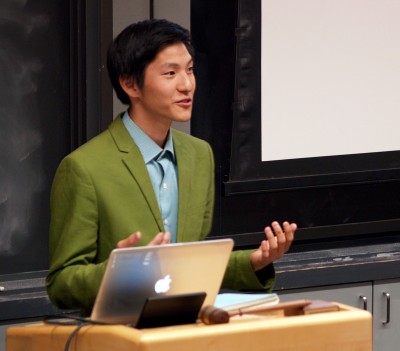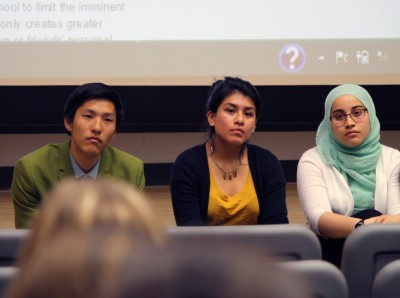
Boston University Student Government held its last Senate meeting of the semester Monday, passing a variety of initiatives to the newly elected executive board members for the 2015-16 academic year.
SG wrapped up the semester by ratifying their constitution, funding a new initiative and confirming Tim Geraghty as next year’s judicial commissioner.
Joe Ferme, the outgoing executive president of SG, began the meeting by encouraging Senate to “do what needs to be done” for the last meeting.
“We did great things this semester,” said Ferme, a senior in the College of Arts and Sciences in his speech. “We voted on a lot of good stuff. Do what you’re passionate about. You’re not forced to be here. The next E-board would really appreciate people who are passionate about [Senate].”
Andrew Cho, the SG president-elect, recalled his experiences in SG, expressing his appreciation and hope for Senate.
“I remember those Monday nights. They [the meetings] were so stressful, but also in a really weird way, so inspiring because there were really big ideas,” said Cho, a junior in CAS, at the meeting. “I just really want to appreciate you guys [senators] being here every Senate. The rest of the E-Board, and I am really excited to move forward with the initiatives and really empower you guys.”
Melesilika Finau, a sophomore in CAS, officially addressed her resignation from her position as executive vice president for the upcoming semester.
Finau’s resignation prompted an investigation that led to BUtiful Dreamers candidate Barron Roth, a junior in the College of Engineering, filling the vacancy, The Daily Free Press reported on Monday.
Geraghty, a junior in ENG and the executive vice presidential candidate for the TeamBU slate, was elected as judicial commissioner with 23 votes and two abstentions.
Commissioner Louis Vitti, a sophomore in the Questrom School of Business, led the vote to ratify SG’s constitution. It received 22 votes and three abstentions.
Senate also granted approximately $2,800 in funding for the Environment Student Organization to create a CAS Greenhouse with 21 votes, one nay and three abstentions.
The money will be used to work on composting, solar energy and maintenance, said ESO Senate representative Juliahna Green.
“It’s going to be huge when we can start inviting people over to the greenhouse and start running greener initiatives,” said Green, a freshman in CAS, after the meeting. “We’re going to have people research in the greenhouse, making it a study space, gardening space. It’s just something we’re really excited about.”

The Senate meeting followed a town hall hosted by the incoming executive board that focused on sexual assault on campus, multicultural sensitivity, senate representation and executive board expectations.
Approximately 50 students, some who serve as senators, attended and voiced opinions on the topics of discussion. Several current SG members and attendees debated and addressed students’ opinions on SG’s initiatives and programs.
Despite arguments during the town hall, Ferme thanked the incoming executive board for hosting the town hall as a “great way to hear students’ voice.”
Cho said that he was inspired by what he experienced as a Residence Hall Association senator to make SG have a more comfortable feel.
“I’ve learned the most this year,” he said after the Senate meeting. “I’m really looking forward to making SG a community that people want to be involved been. It’s just traditionally been a hustle environment within Senate.”
Stephen Chang, the current Senate chair, said that SG succeeded in passing a lot of initiatives and proposals and in spending money effectively.
“This semester went pretty well,” said Chang, a junior in CAS after the meeting. “Getting Senate back to work, it’s really important and that’s what we were able to do with the senators’ cooperation. [The town hall meeting] was the vocal minority being overly loud and it was the same people saying the same thing. If they were really truly unhappy, they could’ve come to Senate.”
Ferme said Monday’s meeting was a “good set up for next year,” and hopes that the student body will see a great impact from passed initiatives.
“There was a lot that we were not expecting as an E-Board,” he said after the Senate meeting. “We adapted really well. SG took it really well. The student body responded well. We had a lot of money, and we had a lot in our control to make sure that it was coming directly back to the students and I don’t think we lost focus on that throughout the year so that’s what I’m pretty much proud of.”



















































































































